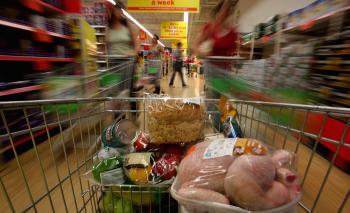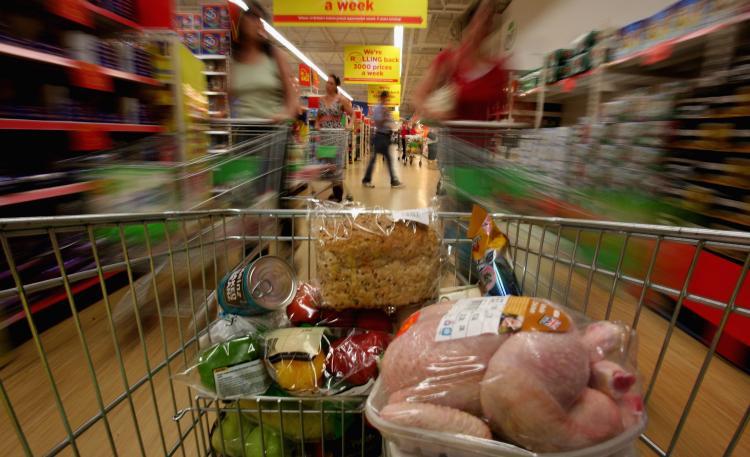Food prices continue to skyrocket and calls to reduce the Government’s GST take appear to have been rejected.
Lobby groups are appealing to the Government to help poorer families struggling to pay for basic foods.
Countries including Kenya, Uganda, Fiji, and Belize have, or are intending to, remove taxes on basic foods.
Rioting by hungry crowds and steep increases in the price of food has forced the Kenyan government to remove sales taxes on food and drastically reduce duties on imported foods.
New Zealand’s food prices have risen 8.2 per cent since the beginning of this year, the largest increase in the cost of food since 1990, according to Statistics NZ.
Prices across all food groups have risen. Basic foods, including cheddar cheese (61.9 percent), fresh milk (22 percent), butter (86.6 percent) and bread (15.2 percent) have had the biggest price hikes.
Financial director Bernard Hickey, of the website www.interest.co.nz , said a look at the average household income and expenditure from April 2004 to 2008 shows that families are hurting.
Rising food prices, petrol and mortgages has left the average nuclear family with a $170,000 mortgage and $38 less than they had four years ago, Mr Hickey said.
Removing GST a Sensible Move Says Family Party
Removing GST on food items will bring health benefits to the nation, leader of the Family Party, Richard Lewis, said.
If families are able to buy nutritious food the health benefits will more than compensate for any loss to the economy through the removal of GST, he said.
Mr Lewis suggested that the $51 million of GST added to the cost of fruit and vegetables each year should be compared with the $200-$300 million spent treating nutrition-related diseases, including diabetes and coronary heart disease.
Removing GST from fresh fruit and vegetables would, in turn, reduce health costs and discourage people from choosing cheaper, less healthy options, he said.
Mr Lewis said politicians are reluctant to remove GST for various reasons, including potential compliance issues.
“Our view is that the benefits in the bigger picture would far outweigh those issues to start with and it is not that difficult in just charging zero on certain items because it happens for other items in our economy already.”
The burden of taxes that will be placed on New Zealanders related to the carbon emissions trading scheme follows a model that is complex, but apparently not too difficult for the Government to put into place, Mr Lewis said.
From Kaitaia to Bluff – GST Petition
Residents Action Movement chairman Grant Morgan is hoping to make ‘GST off food’ an election issue.
His party has collected about 18,000 signatures on a petition that will be presented to parliament just before the election in October.
The Maori Party is the only political party that has given ‘unqualified support’ to removing GST off food.
Mr Morgan said politicians refuse to support the change, because they think it would encourage people to demand the removal of GST from other items such as petrol and house rates.
He says changes to the tax system in 1988 has meant progressive taxes were replaced by flat taxes.
“What this has meant is that taxation that was paid by upper income people was lessened, or in some cases removed, and transferred to the majority of modest to middle income people.”
Lobbying by Health and Social Groups
The National Heart Foundation is calling for the removal of GST from fresh fruit and vegetables.
Medical Director Norman Sharp said they have been advocating for it for years.
He said the Ministry and the Treasury have told him for years that they can not afford to remove GST from basic food. “From a practical, pragmatic and political standpoint, it is not going to happen,” Professor Sharp said. “We have been advised for years from the Ministry and actually from Treasury and from behind.”
Public Health Association national executive officer Gay Keating said that middle income groups were also being affected by the high cost of living, especially those with mortgages.
Dr Keating said the Government must remove GST from healthy basic foods to win the campaign against obesity and diabetes.
“Making healthy products ‘cost-attractive’ would be a huge step in the right direction.
“But it’s almost a matter of survival now with the price of even the basics soaring way past what people can comfortably afford, she said in a press release earlier this year.
Massey Research Reflects Concerns
Massey University researcher, Emma Dresler Hawke said last year that 87 percent of 1220 New Zealanders surveyed supported removing GST on food. The question was part of a wider survey, the International Social Survey Programme, looking at the role of the government.
Respondents believed the removal of GST could help improve the country’s health if people ate more fresh fruit and vegetables.
The survey showed more people were concerned with the ‘obesity epidemic’ and the consequences of consuming high levels of fat, sugar and salt.





